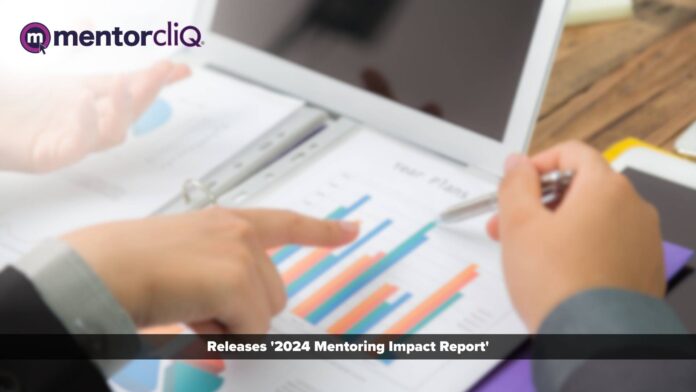MentorcliQ releases its 2024 Mentoring Impact Report, broadening the scope to feature key data on the global impact of mentoring, diversity in the C-Suite, and the growing impact of mentoring on Employee Resource Groups (ERGs).
MentorcliQ, a leading employee mentoring platform for enterprise businesses and Fortune 500 companies, reports on new insights from its 2024 Mentoring Impact Report, an analysis of how mentoring impacts the top revenue-producing organizations in the US and abroad. The third annual report on the mentoring landscape within the US Fortune 500 shows that 98% of these companies now visibly provide mentoring programs to their employees.
This refreshed data marks a significant jump from the 84% MentorcliQ reported in the inaugural 2021 edition of the report, and a still-sizable year-over-year increase from the 92% reported in last year’s edition. Over two dozen additional Fortune 500 companies now publicly advertise their employee mentoring programs, bringing the total number to 488. This shift occurred even amid significant employment and economic trends, including an increase in “quiet quitting,” rising inflation, and layoffs across multiple industries.
MentorcliQ’s 2024 edition of the Mentoring Impact Report offers critical new insights not just on the impact of mentoring within the US Fortune 500 but also on DEI. Of note is the increasing diversity within the CEO’s chair. The new edition of the Mentoring Impact Report shows that women and individuals from historically underrepresented groups now account for 23% of CEOs in the US Fortune 500, up from 20% a year ago. Additionally, MentorcliQ found that 100% of companies run by women have mentoring programs, a signal that women-led organizations are among the most supportive of employee development, engagement, and inclusion.
“The data is fairly conclusive: Mentoring reached a saturation point among the Fortune 500. The only question is, what’s next? The data points to a clear expansion of DEI among industry leaders, with an invigorated focus on measurability for development and engagement programs like ERGs and mentoring,” said Gracey Cantalupo, Chief Marketing Officer at MentorcliQ.
“In conversations with our Fortune 500 clients, we’ve seen consistent alignment that the next step in their strategy is to continue expanding these programs for broader organizational reach, measuring success in a way that’s clearly tied to organizational goals, and tying their development strategies to other types of traditionally harder-to-measure programs, such as ERGs. What we’re hearing is a strong push toward creating a more cohesive development and engagement strategy that more directly impacts the bottom line.”
Additional insights from the report point to why this matters to organizations focused on revenue growth through employee engagement, development, and retention:
- Companies with visible mentoring programs were over 2X more profitable
- 100% of companies recognized for their approach to Diversity by Fair360 had both ERGs and mentoring programs
- 83% of companies new to the Fortune 500 list already had mentoring programs
The rapid expansion of mentoring as a flexible and measurable approach to employee engagement, development, and retention is a response to multiple factors:
- An historic decline in employee productivity, engagement, and job satisfaction
- A rise in skills gaps
- Persistent recruiting and hiring difficulties
“Mentoring has consistently proven effective in helping companies solve many of their biggest employee-related challenges,” Cantalupo explained. “Not only have we witnessed structured mentoring lower turnover by as much as 75% among employees who participate in these programs, but we’ve also seen participants consistently express satisfaction with these programs at a rate of 90% or more. That these companies are also taking the success they’ve seen with mentoring and merging this approach into their DEI programs is a testament to how successful structured mentoring has become at producing positive and repeatable results.”





